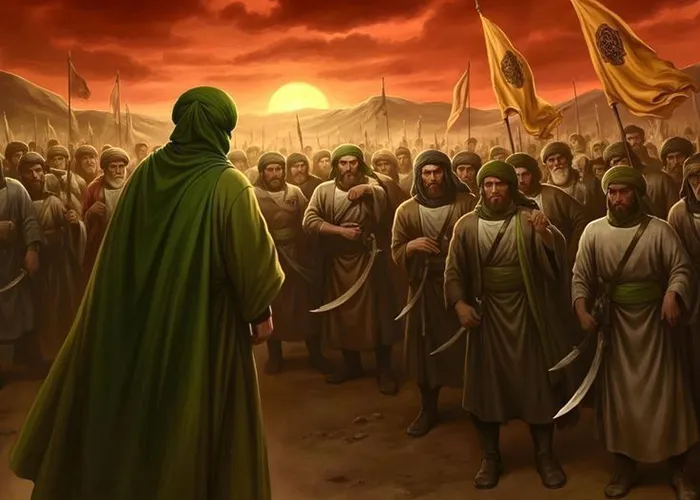Topic of the Week – Volume02 Issue38
The Most Important Factors Influencing the Acceptance of the Forced Peace by Imam Hassan al-Mujtaba (peace be upon him)
Seyed Hashem Moosavi
Introduction
The anniversary of the forced peace by Imam Hassan al-Mujtaba (pbuh) is a valuable opportunity to reflect on one of the most critical junctures in Islamic history; an event that, while seemingly meaning the surrender of the caliphate to Muawiyah, was in reality a profound strategy based on religious expediency. The choice of this topic in this bulletin is due to the anniversary of this historic peace, so that its audiences can become acquainted with the deeper dimensions of this great decision.
Imam Hassan (pbuh) accepted peace under circumstances where, on one hand, the Islamic Ummah was plagued by turmoil, betrayals, and internal divisions, and on the other hand, a powerful and organized enemy like Muawiyah and the Umayyad apparatus had entered the arena with all their propaganda and political tools. Examining these factors shows that the acceptance of peace was not due to the Imam’s personal weakness, but rather out of wisdom, realism, and foresight to preserve the essence of Islam.
Internal Situation and Weakness of Military Forces
One of the most important reasons for accepting peace was the chaotic internal conditions and the lack of cohesion among the Imam’s forces. The people of Iraq, after the long wars during the time of Amir al-Mu’minin Ali (pbuh), were severely war-weary. Their spirit of jihad and resistance had weakened, and this practically deprived the Imam of the possibility of a decisive battle.
Simultaneously, Muawiyah, through financial promises and political privileges, attracted some commanders and influential figures of Iraq to his side. Alongside the fatigue and lack of spirit for jihad in the way of God, the betrayal of the nobles of Kufa and the leaders of Imam Hassan’s (pbuh) army further weakened the morale of the Imam’s forces. Numerous historical sources emphasize the betrayal of a part of Imam Hassan’s (pbuh) army. These sources report that a large part of Imam Hassan’s (pbuh) army, influenced by Muawiyah’s propaganda and financial enticements, lost their motivation, and some even joined the enemy’s camp.
Sheikh Mufid in Al-Irshad reports that “When Imam Hassan (pbuh) was preparing his army for battle, some of the army commanders who were seduced by Muawiyah’s gold and silver, by taking bribes or promises of positions, separated from the Imam’s camp and some even openly joined the camp of Sham (Syria) (Al-Irshad, Vol. 2, p. 10).”
Al-Tabari also has a similar report in this regard, saying, “Some commanders and soldiers, upon receiving bribes, joined Muawiyah”. Also, in the book Answering the Doubts about Ashura, Ali Asghar Ridhwani, Page 316, it is mentioned that the Imam appointed four army commanders, all of whom Muawiyah attracted to his side by paying bribes.
These propaganda and enticements practically caused many people to be lax in their support for the Imam and leave him alone on the battlefield. The Imam (pbuh) directly refers to this matter somewhere, saying: “If I had companions who would sacrifice their lives for the truth, I would never hand over the government to Muawiyah.”
External and Security Threats
Another important factor in Imam Hassan’s (pbuh) acceptance of peace was external and security threats. On one hand, the Khawarij (Kharijites), who were still active after the Battle of Nahrawan, posed a serious threat to internal stability. They not only threatened both sides of the conflict with their extremist slogans but also practically caused chaos. Ibn Athir in Al-Kamil fi al-Tarikh Vol. 3, p. 406, reports that the Khawarij even attacked Imam Hassan (pbuh) during his movement towards Nukhaylah and wounded him. Continuing the war in such an atmosphere could have led to further weakening of the Ummah and creating an opportunity for them to gain power.
On the other hand, Muawiyah, with a widespread network of spies in Kufa and Basra, had agitated the political and security atmosphere of Iraq. Al-Tabari notes that Muawiyah, by sending spies and spreading rumours, severely disrupted the security of the Iraqi front (Tarikh al-Tabari, Vol. 4, p. 119). Such conditions warned Imam Hassan (pbuh) that war would not only not lead to victory but would also put the foundation of Islamic society at risk of complete collapse.
Muawiyah’s Deceit and Psychological Warfare
Psychological operations have a history as long as human social life and have always been a tool for eliminating rivals. The effectiveness of this tactic largely depends on the psychological and mental state of the people who are the target of these operations. The Holy Quran mentions examples of these tactics: The threat tactic: «قاُلواَ لئِن لم تنتَهِ یاُ نوح لتَکُوَننَّ مِنَ اْلمَرْجُومِین»”They said, ‘If you do not desist, O Noah, you will surely be of those who are stoned.'” (Ash-Shu’ara: 116). Elsewhere, regarding the use of the slander tactic by the leaders of the disbelievers’ front, it says: «إِنْ هُوَ إلّا رَجُلٌ بهِ جِنَّۀٌ فَتَربصُواِ بهِ حَتَّی حِین» “He is not but a man possessed with madness; so, wait concerning him for a time.” (Al-Mu’minun: 25). Elsewhere, regarding Nimrod’s use of the doubt tactic against Prophet Ibrahim (pbuh), it says: «قَاُلوا أَجِئْتَنَاِ باْلحَقِّ أَمْ أَنتَ مِنَ الَّلاعِبِین» “They said, ‘Have you come to us with truth, or are you of those who jest?'” (Al-Anbiya: 55).
Muawiyah, who was a very cunning and deceitful person, with his usual malice and cunning, sought to impose peace on Imam Hassan (pbuh); he used “deception” and “trickery” – the psychological operations of the time – to change the attitudes, motivations, interests, behaviour, and speech of the people under the Imam’s command in favour of his own interests. With the collaboration of cunning individuals like Mughirah ibn Shu’bah, Amr ibn al-As, and several others, he designed and implemented deceptive strategies to weaken the Imam’s legitimacy and prepare the ground for his goals.
Using the propaganda and media tools of his time, he cast doubt and suspicion in the public sphere of society. He introduced himself as a peace-seeking figure and, in contrast, portrayed Imam Hassan (pbuh) as warmongering.
Al-Tabari in Tarikh al-Umam wa al-Muluk recounts that Muawiyah, by sending numerous letters to the chiefs of the Iraqi tribes, introduced himself as a well-wisher of the Ummah and an advocate of unity, while his main goal was to weaken the Imam’s popular base (Tarikh al-Tabari, Vol. 4, p. 118).
Ibn Athir also writes in Al-Kamil fi al-Tarikh: “Muawiyah had gained extensive influence among the tribes of Iraq and, with his political tricks, shook the will of the people” (Al-Kamil fi al-Tarikh, Vol. 3, p. 405).
Another important tactic of his against Imam Hassan (pbuh) was character assassination. Through extensive psychological operations, he created an atmosphere where even some Shiites developed doubts and a negative view of their Imam. A clear example of this influence is the encounter of Sulayman ibn Surad al-Khuza’i; when he came to visit the Imam after the peace, instead of showing respect and honour, he said bitterly: “Peace be upon you, O you who have humiliated the believers!” (Al-Dinawari, 1388 AH, p. 151).
Expediency for Preserving the Islamic Ummah
Under these circumstances, instead of engaging in a bloody and futile war, Imam Hassan (pbuh) saw the expediency in preventing the destruction of Islam and preserving the lives of his Shiites. In response to the objections of some Shiites, he said: “I saw that most people desire peace and are averse to war; I did not want to force them into what they disliked. So, for the sake of preserving the lives of a few of my Shiites, I made peace.” )A’lam al-Hidayah, Imam al-Husayn (as), p. 147).
This statement shows the Imam’s realistic view of the existing conditions and his preference for saving Muslim lives over continuing a fruitless war.
This decision was, in fact, a tactical retreat to preserve the human and spiritual capital of the Islamic Ummah; a decision that also paved the way for exposing the true face of Muawiyah and the Banu Umayyah.
Political Conditions and the Terms of the Peace Treaty
Historians list some of the conditions of Imam Hassan’s (pbuh) peace treaty as follows:
- Acting upon the Book of God and the Sunnah of the Prophet.
- Delegating the matter of caliphate after Muawiyah to Imam Hassan (pbuh), and in case of any incident befalling him, to Imam Hussain (pbuh).
- Prohibition of Muawiyah from harassing and harming the Alawites and Shiites.
- Returning the usurped financial rights to the Alawites, Ansar, and the special companions of Imam Ali (pbuh).
- Prohibition of Muawiyah from insulting and cursing Imam Ali ibn Abi Talib (pbuh) in public gatherings (pulpits, prayers, etc.).
- Prohibition of Muawiyah from using the title “Commander of the Faithful” for himself.
- Prohibition of him from appointing a successor for himself.
(Al-Irshad, Vol. 2, p. 13; Amin Ameli, Sayyed Mohsen, Imam Hassan and Imam Hussain (pbut), pp. 70 and 54)
Imam Hassan (pbuh) knew well that Muawiyah would not remain faithful to these commitments. After establishing himself in Kufa, Muawiyah openly said: “By God! I did not fight you so that you would pray and fast, but I fought to rule over you; and now that I have achieved my goal, I have trampled all commitments underfoot” (Tarikh al-Tabari, Vol. 4, p. 120). This historical confession is the best witness to Imam Hassan’s (pbuh) foresight in signing the peace. These very betrayals later revealed the true face of the Umayyads to the Ummah. As history showed, Muawiyah not only did not keep his promise, but by imposing the succession of Yazid, he also laid the groundwork for the tragedy of Karbala.
Conclusion
The acceptance of peace by Imam Hassan al-Mujtaba (pbuh) was not a defeat, but an intelligent and necessary strategy in extremely complex circumstances. A combination of fatigue and low morale among his own forces, the betrayal of commanders, internal security threats (such as the Khawarij), and Muawiyah’s extensive psychological warfare placed the Imam in a position where continuing the war would have meant the complete destruction of the remaining Islamic community. With wisdom and foresight, by concluding a peace treaty with specific conditions, the Imam both saved the lives of the Shiites and paved the way for exposing the true face of the Umayyads and the future awakening of the Ummah. This peace was a prelude to the uprising of Ashura and the eternal disgrace of the oppressors.
editor's pick
news via inbox
Subscribe to the newsletter.




